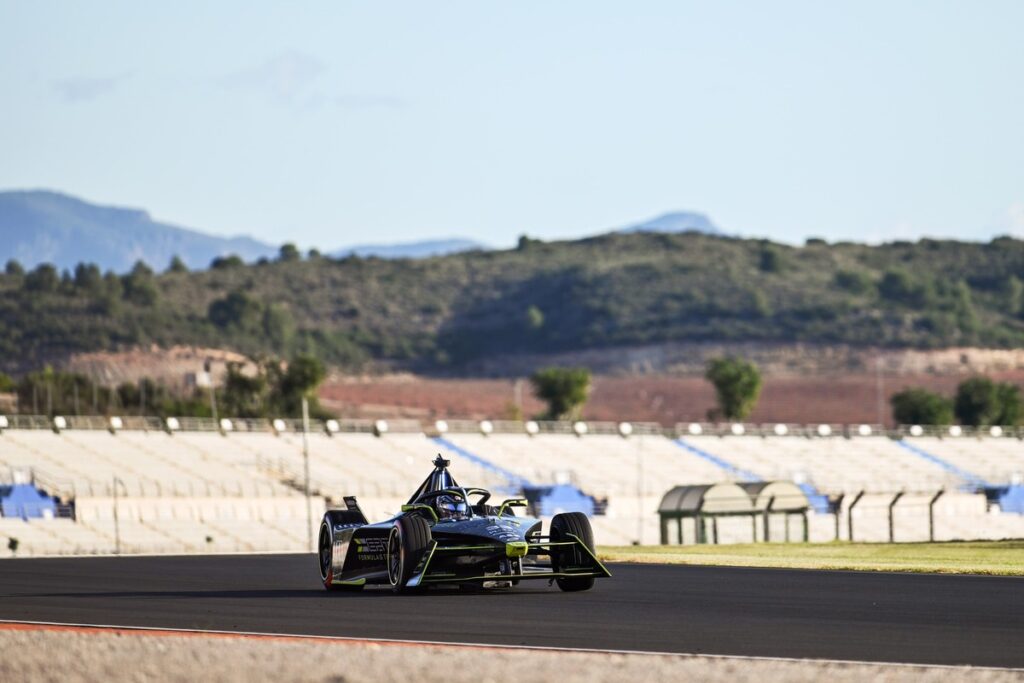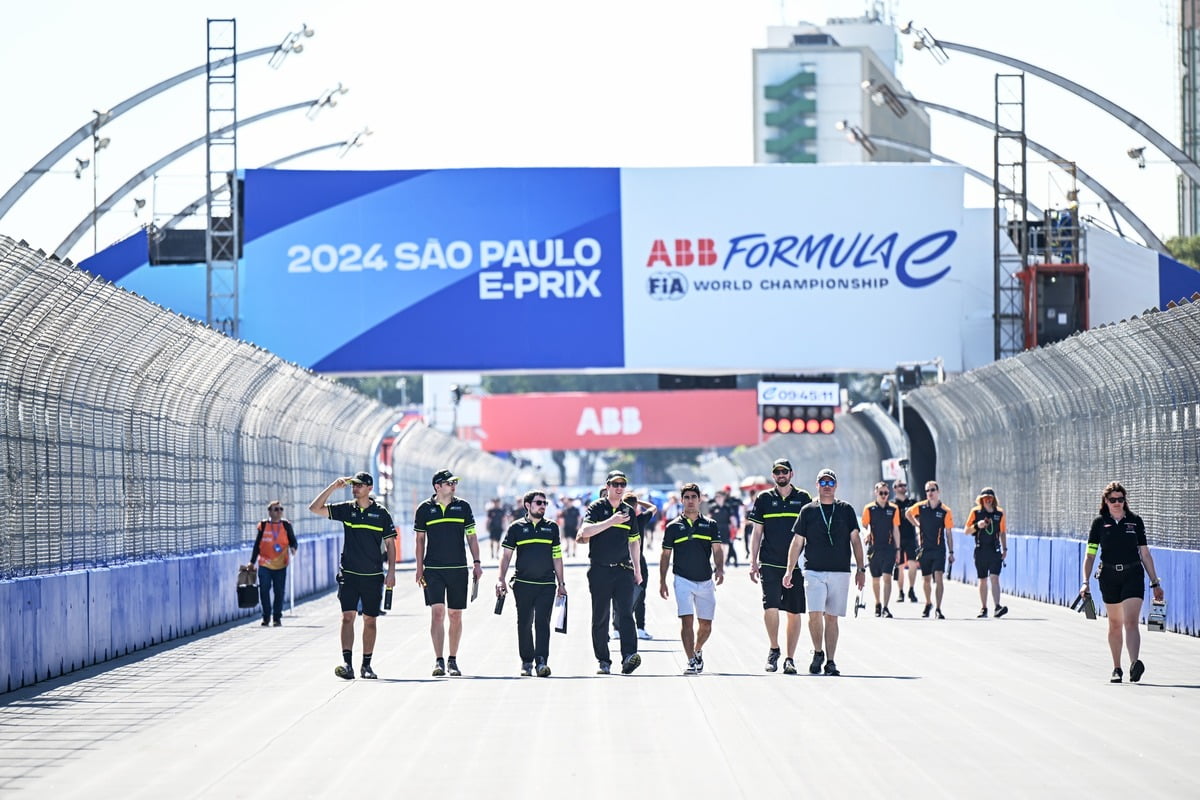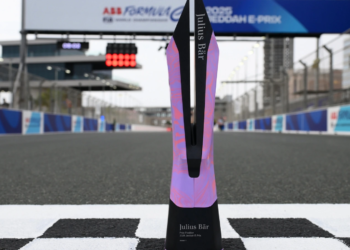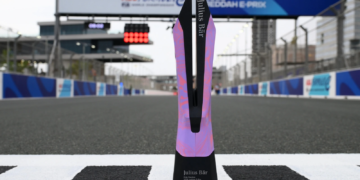In the second and final part of Motorsport Monday’s exclusive interview, FIA Formula E’s VP of Sustainability, Julia Palle, discusses moving its HQ to Valencia, the GEN4 era and the sport’s recent recognition as the most sustainable sporting entity on the planet.
Formula E recently announced its first-ever support series – the NXT Gen Cup, featuring male and female drivers between the ages of 15 and 25, all driving electric MINI Coopers. Palle says the series encapsulates the technology of EV racing as well as further work towards the FIA’s Girls on Track project.
“The launch of the support series is a fantastic opportunity for us to showcase males and females driving the same cars, so really, it’s the next level of Girls on Track, up the ladder of making sure that we’ve got some female role models at every level and every role in the championship, so NextGen is very exciting for that.
“It is also the opportunity to showcase, again, the various direct technological transfers in between the cars that you see on our tracks and the cars that they will be driving, so it’s a double opportunity from a sustainability point of view to basically keep elevating to say that we are here to communicate and inspire them to live sustainable lifestyles.”
Formula E recently announced that it will be moving its technical hub and logistics HQ to a location at the Circuit Ricardo Tormo in Valencia. Palle explains the reasons for the move is to further enhance the sport’s constant environmental credentials.
“Having Valencia as our technical hub and logistics HQ is fantastic from a logistical point of view because 70 to 75 per cent of the main share of the carbon footprint of the championship is due to logistics.
“Having our hub based in Europe, where it’s going to be far easier to operate, will mean that next season, we will have a much more seamless operation in terms of sustainability and how we can organise the logistics around the world with far more sea freight which is going back to the wider objective linked to our ongoing Net Zero commitment and reducing the CO2 emission, always in line with science-based targets.”
Given that Formula E is, in historical terms, still a new and fresh sport, its fandom is increasing all the time. Palle puts this down to a mixture of the format of the race weekends, as well as the environmental side, all appealing to today’s youth.
“I think the reality is Formula E is the fastest-growing motorsport on the planet at the moment and for the foreseeable future that’s clear because the value proposition of the sport is the strongest that you can find.
“The sport is exciting, it’s a format that is really matching the appetite of the nowadays fun, younger generation – they don’t have a long attention span, so it’s a bite-sized format where you have the thrill of the sport and you get extremely excited by the end of the race.
“And also because a lot of the young generation demand anything that they are involved in is to be inherently sustainable, they have taken reassurance that in Formula E, sustainability is taken to the maximum in terms of consideration and I think that’s why you will see that progressively all those audiences figures are going to be multiplied again because we’re really, right here and right now, probably the most adequate sport proposition that there is in the world.”
A possible impasse may be felt in regards to the shorter races, as it has been heavily-mooted that the forthcoming GEN4 era of Formula E will enable races to be longer due to the technological advances of the cars. Palle acknowledges the balance that is needed to make the transition work for every aspect.
“I think it’s always important to be able to showcase the technological advancement and the reality is that GEN4 is going to be a faster car, which is again something we’ve always wanted,” says Palle.
“If we take a step back and think about the GEN1s that could not finish races, the drivers had to change halfway through races.
“It’s fantastic and it’s really the direction of travel, it’s also what we want and what we need for the EV industry as a whole because we want batteries that are able to last longer and drive faster, so it’s the right message.
“We need to give that opportunity for GEN3 to showcase that performance, and sporting context and element to that is absolutely fine, but we are acutely aware of the fact that the relatively short racing format is one of the key assets that we can, so we will make that change very consciously, making sure that we can give the space to showcase GEN4 while making sure that we respect the sporting integrity that has us successful.”
Off track, Formula E has also partaken in initiatives to create awareness for environmental causes, such as Jaguar TCS Racing donating its old team apparel to first-year fashion students at Coventry University, for them to make new items from what was donated. Palle explains that Formula E itself is making similar gestures, as well as her wish for more to take place.

“We have a constant working group with all the teams where we discuss joint sustainability initiatives.
“The one of Jaguar, for example, has triggered some ideas amongst the working group as potentially discussing the opportunity to do something together for all the teams in terms of the uniform recycling. Formula E itself has its own recycling program, and last year, in Berlin, we donated around 900 items of clothing to charities in order to help Ukrainian refugees who were in Tempelhof [the district of Berlin in which the E-Prix is held].”
“A couple of years ago, the same working group introduced the concept of all the teams having an environmental system in line with the FIA three stars accreditation, that became part of the sporting regulations, so something really unique in Formula E is that the teams cannot race, they can literally cannot put the cars on track if they are not adhering to the highest level of environmental management system, and so those working groups have led to these joint projects where the teams have come together with us, discussing how we can basically keep raising the bar of the sustainability standard of the championship as a whole, and everyone benefits when the teams are putting those projects in place.”
Formula E was recently named the joint most sustainable sporting entity in the Global Sports Sustainability Benchmark in Sports annual report for the second year in succession. The achievement shows that FE is following through on its pledges, and Palle explains how the rankings work.
“It’s a completely independent, third-party validated assessment.
“In essence, we receive, on a yearly basis, an Excel document, just to simplify, where they assess, through tens of questions, our environmental, social, economic and governance setup structures, and so we basically communicate, for example, the way we do our carbon calculations, the way we are creating local impact, the way the board is set-up and so on.
“Based on that, they compare, with some very complex formulas behind the spreadsheet, the sports across the board.
“So what is really powerful is that the assessment is across 300 global properties from the NHL, NBA, football clubs like Borussia Dortmund and Juventus, to cricket clubs in India.
“It seems crazy to try and compare apples and pears because you have a championship like ours that is a travelling circus versus a huge stadium in a location, but the beauty of their approach being very robust behind the scenes, using the best techniques, is giving this final ranking.”
Lastly, there was further recognition for FE recently with the announcement that it was nominated for the Best Sports Organisation at the VEVO Sports Awards. Further evidence, if it were needed, that Palle is going above and beyond in her role to see the sport is being recognised by various organisations, and she spoke of her pride in the nomination.
“It’s always very nice to be nominated for such prestigious recognitions.
“The reality is that it’s not that we’ve done anything more than what is our day-to-day job.
“We are simply following our sustainability strategy and trying to really be the best version of what sustainability can be and can look like in sport and in general to set a standard and an example of how you can really be a business, because we’re not a charity, but a business that really takes into account the environmental impact, the social impact and the economic prosperity of everything that we do.
“So the nomination is just the result of us trying to be positively disruptive, to the benefit of sustainability as a change of paradigm in the world, and God knows we are seeing a lot of instability in the world at the moment, from the geopolitical perspective to the financial perspective and I think it’s quite clear to all of us at this moment in time, that we need a real change of paradigm and that change is one that is going to take care of people first and that people will take care of their planet, and that’s the very definition of sustainability.”









